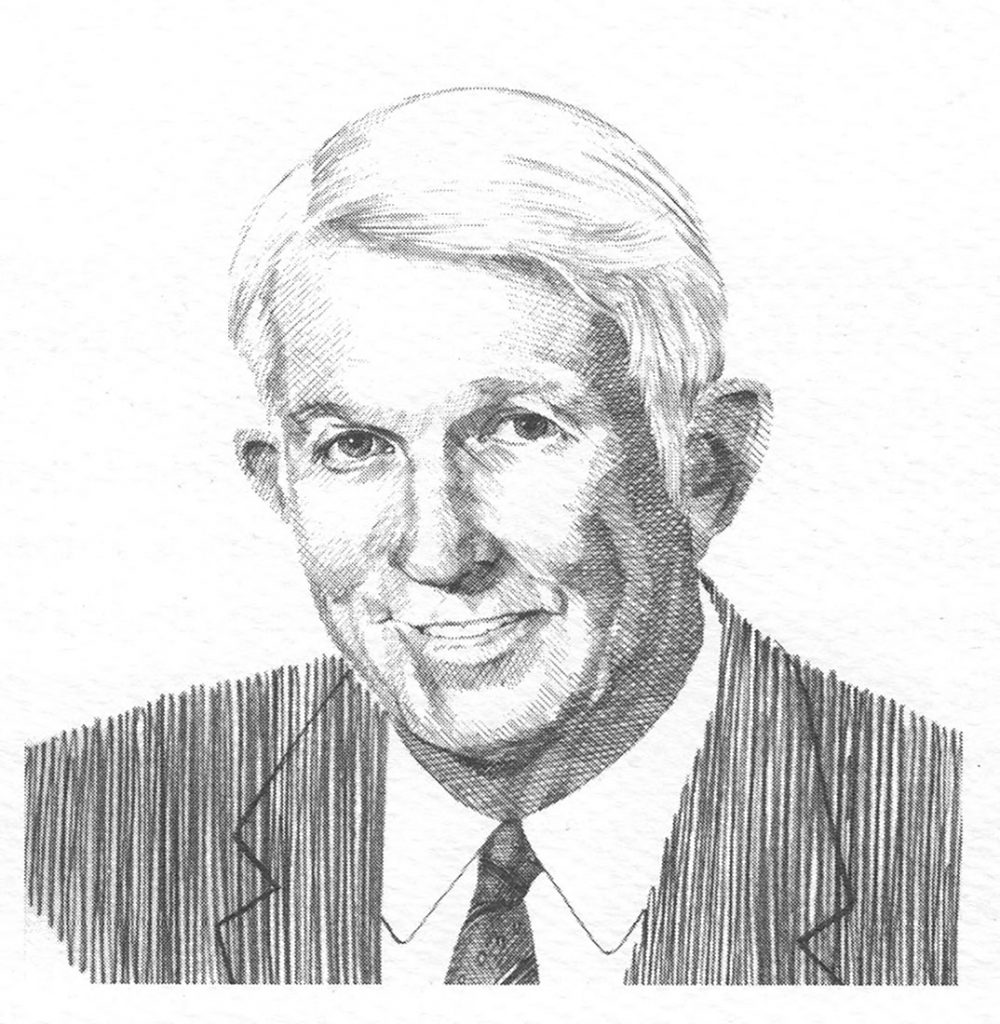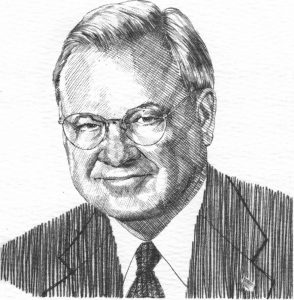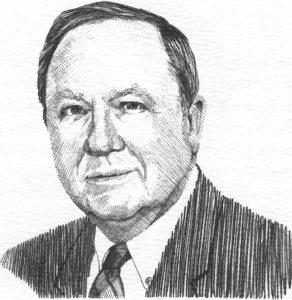Logging and sawmilling have always been hard and dangerous work, and the lumber business has its share of legends. In the Southern lumber business, few legends are bigger than Ben C. Stimpson, who has spent his life cutting timber, processing lumber, and promoting wildlife conservation.
Ben Stimpson was born in Mobile, the son of Frederick Taylor Stimpson and Mary Edna White-Spunner. He graduated from Murphy High School and attended The University of Alabama where he was a member of the Delta Kappa Epsilon fraternity.
He began his lumbering career in 1940 when as a teenager he worked for his father’s lumber company in South Alabama in a summer heat so fierce that at the end of the day even his high-top shoes were soaked with sweat, a sight that Stimpson says made his father howl with laughter. But the hard work and sweat paid off.
In 1941, his father was operating Stimrad Lumber as well as a thriving piling business that furnished pilings for the foundations for the bulkheads and docks along the Gulf coast. That same year, his father, a savvy businessman, decided to form yet another new company called Southern Logging Company, with Ben and his two brothers as the owners.
But World War II put the logging business on hold and in 1945 Stimpson completed cadet training and received his wings as an Air Corps pilot at the University of Tennessee. But before he could be deployed, President Truman ordered the bombing of Nagasaki and Hiroshima and that brought the war to a close. Stimpson returned to South Alabama and the three brothers returned to the lumber and logging business.
During that same period, Ben May, a close friend and business associate of Stimpson’s father, had purchased a lumber concentration yard in Mobile to process timbers and lumber for use in World War II. Timber was cut from the forests around Mobile and sawn into green lumber by “peckerwood” sawmills and then trucked to Mobile for further processing. The 1umber concentration yard was known as Gulf Lumber Company.
After suffering operating losses for several years, May sought new management and contacted the Stimpson brothers to gauge their interest. So after working in numerous capacities under the tutelage of their father, Stimpson and his older brother Billy and younger brother Gordon assumed management of the company and agreed to split the profits 50-50 with Ben May.
With clearly defined responsibilities each brother performed his duties and meshed into a management team that was the envy of the industry. They were held in high regard by their peers for their work ethic and the ability to get along, but more so looked upon with awe as three brothers that were best friends. Under their management, Gulf Lumber Company evolved into one of the most innovative lumber companies in the nation respected for its high standards for quality. Having the responsibility for sales and marketing, Ben Stimpson steered Gulf into niche markets of treated lumber and machine stress-rated lumber while serving first in the capacity of vice president and later as president.
Today, independent logging crews haul more than 400 loads of logs per week to the Mobile plant, most of them from timberland Gulf manages in southwest Alabama, northeast Florida, and southeast Mississippi. The logs undergo a complicated process of weighing, debarking, sawing, trimming, sorting, drying, planing, and grading before the finished product is shipped. State-of-the-art computers are used in each area of the processing to assure that the quality standards are met.
Gulf Lumber Company, one of the largest sawmills in Alabama, annually produces 105 million board feet of yellow pine products shipping primarily into Midwestern and Northeastern markets. About 80 percent of the product is sold to treating plants and truss manufacturers, with about 10 percent going to retail lumberyards, and 10 percent being exported into countries in the Caribbean. Additionally, the company produces 40 million board feet of treated lumber in its own treating facility and recently began an import lumber division to bring in pine lumber from South America.
In 1973, following the death of Mr. May, the three brothers acquired the ownership of Gulf Lumber Company from the May estate. In 1992, Ben Stimpson and his brothers turned the reins of leadership over to the third generation of the sawmilling Stimpsons.
As might be expected of a man who made his living from timber and timberlands, Ben Stimpson has been active in organizations dedicated to protecting timber resources. He has served as a director of the Alabama Forest Products Association as well as a director of the Southern Forest Products Association. He also served on the board of the Southern Pine Inspection Bureau for nine years, three of which were as chairman.
In addition to his interest in preserving the wise use of timber resources, Stimpson has been passionate about wildlife management and conservation. Having been taught by one of the deans of wildlife conservation. Ben Stimpson knows well that wildlife management is as much about managing people as it is about managing wildlife.
Highly respected for his knowledge in this area, he served as president and a member of the board of directors of the Alabama Wildlife Federation and in 1964 received the Governor’s Conservation Award as well as the M.O. Beale Scroll of Merit for his contributions to wildlife conservation. Additionally, he served as a member of the Governor’s Advisory Board for the Alabama Department of Conservation and Natural Resources from 1971 until 1985. Like his father before him and his two brothers, Ben Stimpson is an avid outdoorsman, hunter, and fisherman. Stimpson’s hunting passion is the wild turkey and few can match his bream fishing expertise.
Much of the Stimpsons’ personal life revolves around Choctaw Bluff, a private family enclave overlooking the Alabama River in Clarke County where Ben has been president of the Choctaw Bluff Hunting Club. The tradition began when Stimpson’s father began acquiring land in the 1920s. Ben and his brother have continued to add tracts over the year.
During the late 1940s, he was given the responsibility for renovating an old home, the Big House, on the property for the family’s use. In 1975 Ben built his personal home on the property which he named Stonewall after the nearby Civil War-era Fort Stonewall. On weekdays, Ben and Nedra, his wife of 47 years, find peace and solitude within the confines of Stonewall.
Weekends and holidays are different. On any given weekend one or all the couple’s five children, Ben C. Stimpson and John C. Stimpson, Nedra S. Crosby, Mary S. Turner, and Greer S. Stephens, could be present. In tow could be all or some of the 16 grandchildren.
Though devoted to his family and business, Ben Stimpson has always found time to give to the Mobile community. For 29 years he served on the Board of Trustees of the Mobile Infirmary while chairing numerous committees and helping direct the hospital in its growth from a 300-bed facility to 700 today. He was also instrumental in forming the infirmary’s holding company, Infirmary Health Systems.
In 1970 Stimpson was elected to the Board of Trustees at St. Paul’s Episcopal School. At the time it had grades kindergarten through grade five. It is no secret that Ben became passionate about St. Paul’s School. During his 22-year tenure on the board during which he served as chairman for one term St. Paul’s has developed into the largest Episcopal college preparatory school in the continental U.S.
Ben Stimpson has worked hard but has played hard and enjoyed life. He and his brothers, sons, and nephews have gambled on the Southern forest and invested in the future of the land they love. His hope is that he will be judged as having been a good steward of the resources and talents entrusted to him, and his dream is that his children and grandchildren will strive to be good stewards as well.





